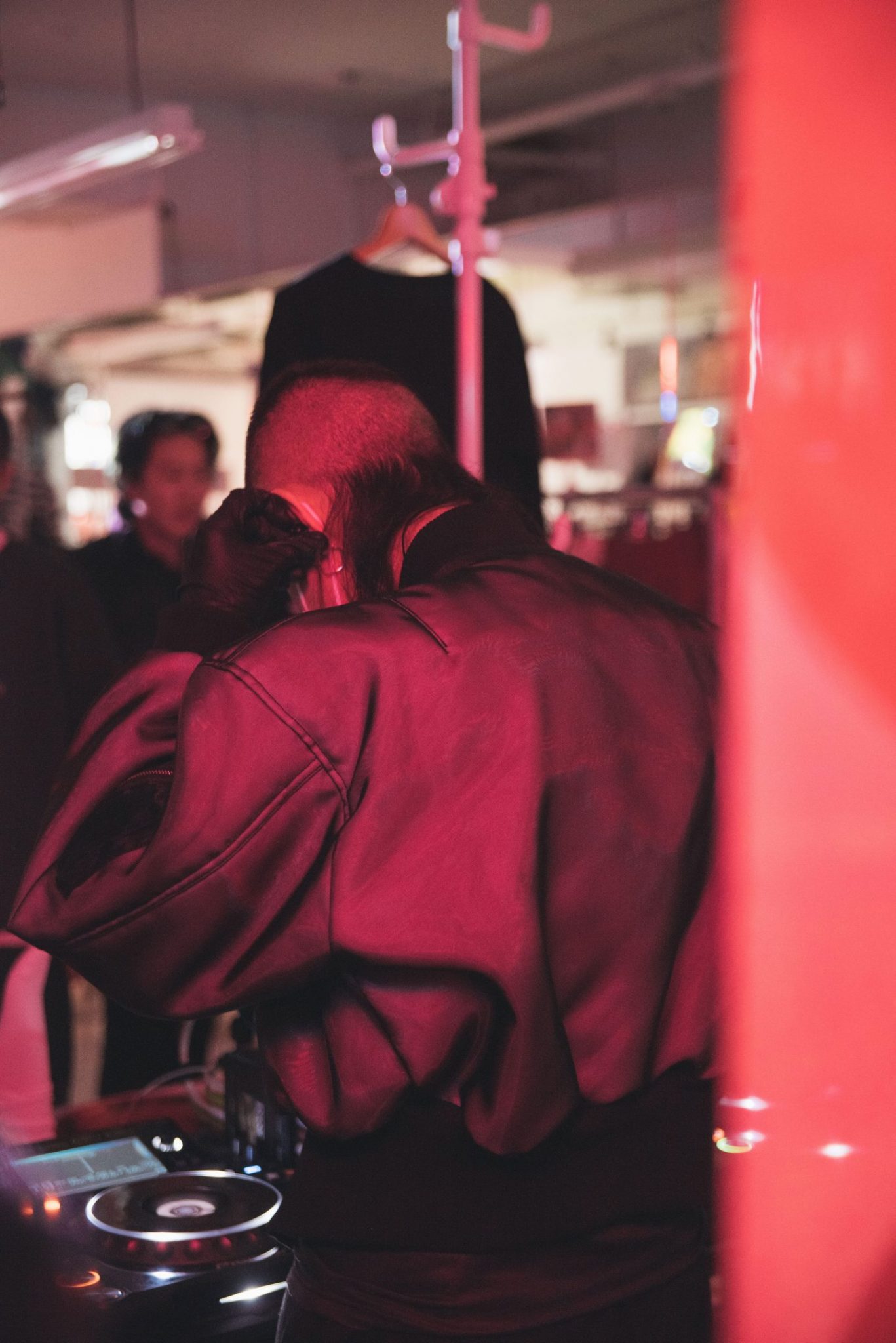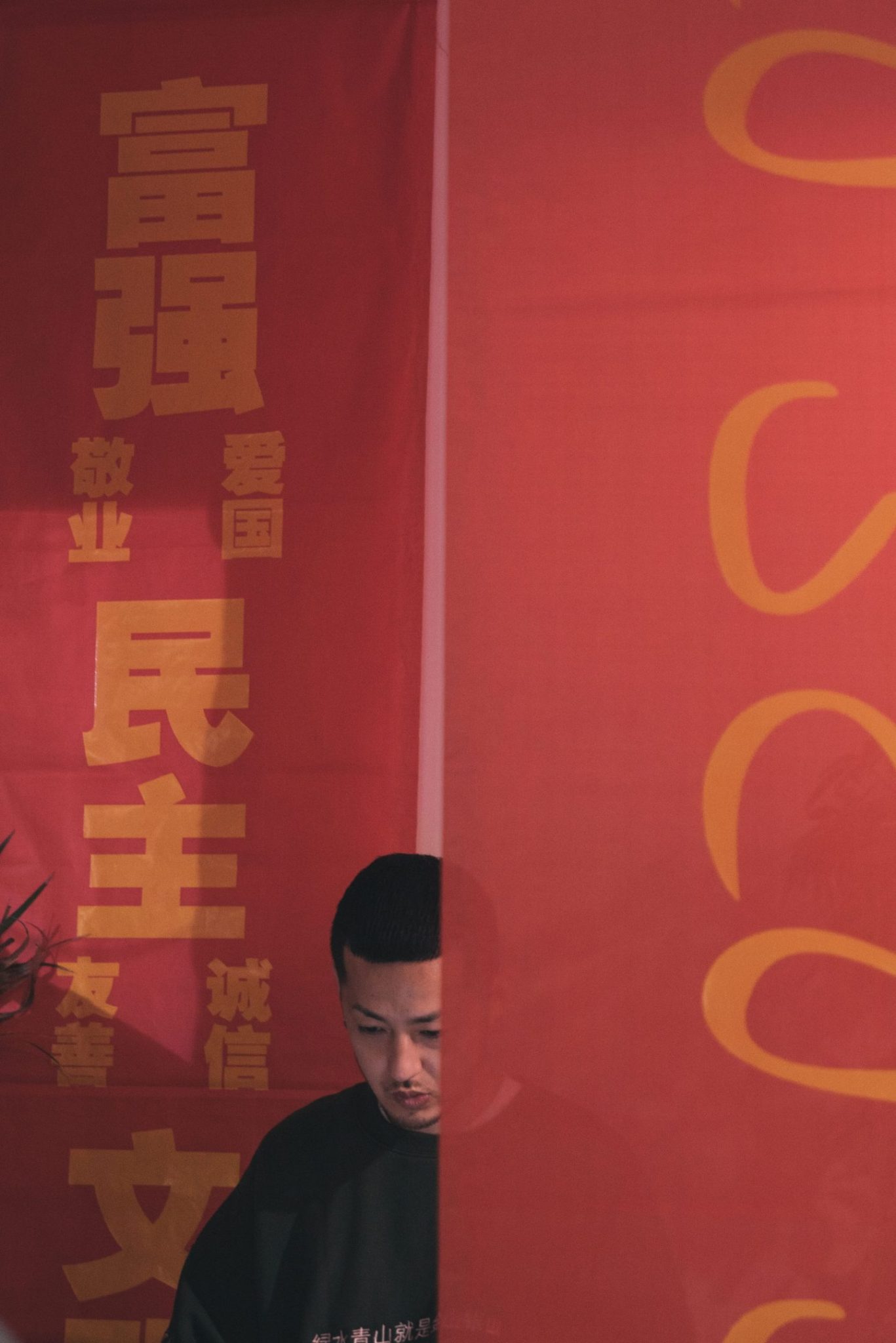Labels and hashtags are shortcuts to getting know a person. Veeeky would rather people wait to see her work and listen to her words before claiming to know her. Something many creatives wish for themselves. It’s easy to say she’s a Beijing-based Taiwanese multimedia artist well-known on the Chinese underground music circuit, but each of those terms is likely to conjure a type of person that could get in the way of really understanding her as an individual. Veeeky’s latest project SCV may reveal the most about who she is while also being the most difficult way to comprehend her.

Veeeky is a multi-hyphenate creative person. She is a graphic designer, a multimedia artist, a DJ, an experimental 3D video maker, and most recently a fashion designer. Her and her husband Howie Lee, a music producer and cofounder of the label Do Hits, have toured around the world and have been described as pioneers in the world of Chinese underground music. Veeeky wouldn’t approve of using these labels to explain herself; in our conversation she emphasized the importance of just being herself and letting her work stand on its own.
We meet prior to the pop-up and launch party of the clothing line SCV, which stands for Socialism Core Values, at Radd Lounge in Shibuya, Tokyo. SCV is Veeeky’s most recent project which she co-directs with three other team members. She’s just landed in Tokyo from Australia where she performed with Howie and their friend Thoiid at the Sydney Festival and Mona Foma arts festival in Tasmania. I’m speaking with her at a time when she’s busy planning events and bringing them to life, but she doesn’t appear tired. Veeeky is a natural at building connections with others and between two separate parties. Veeeky’s friend and frequent photographer Ash Lin is with us as well, but unfortunately Ash is sick and unable to speak much due to a sore throat, so Veeeky speaks for both of them so that I might get to know her too.
Veeeky was born in Taiwan and lived most of her life there. She moved to London in 2012 to complete a Masters. Afterwards, she and Howie bounced between Beijing and Taipei doing two year stints in both cities. Most recently, in relation to starting SCV, they have decided to base themselves out of Beijing. On the difference between living in those two cities, Veeeky says creative work in Beijing seems to have more urgency and that being around many others equally interested in propelling their own work forward is a useful way to stay motivated.

A long sleeve black tee with the SCV logo printed on the front. The letters of the logo are stylized to look like Uyghur calligraphy.

In the fall of 2017, China Central Television frequently broadcasted Xi Jinping’s words stressing the importance of environmental friendliness, “Green mountains and clear water are equal to mountains of gold and silver.” The SCV Green & Gold Hill Embroidery Sweatshirt features that quote in Chinese.

The SCV Bulletin Printed Sweatshirt comes in three styles, each with a different Chinese flyer printed on it advertising pairs of Core Socialist Values.
She discerns two primary forces that are shaping global culture and have given her a boost as well. “It’s related to the economic situation in China, cause it’s popping now. So everyone is watching China.” Secondly, according to Veeeky, “It’s all about the Internet now. It’s the Internet connecting people. Not only in China, but all around the world.” She adds, “But you still have to go out in real life. You have to go and meet up with people and actually check out what’s happening around the world. I think the Internet is just a key.” Naturally, when speaking about China and the Internet, the subject of the Great Firewall comes up, but Veeeky doesn’t perceive of it as a limiting force. “It’s like if you have a wall, you’re more likely to go out and check. But if you don’t have a wall, sometimes you’d rather just stay inside your own area.” She subscribes to the idea that barriers can result in more ambitious, creative work. “Sometimes you get in a situation where you think, “Oh shit, this is so bad,” but in a way, it could be good when you look back on it.”
Reviewing situations and making observations is her strength. Veeeky’s parents both have backgrounds in sociology and when she did her undergraduate degree, she decided to study that too. When I ask her about what has been the most formative influence on her art, she tells me that it’s sociology. “It influences how I think about society, how I use elements around me, how I analyze things, and how I see people and put that in a story.” It’s a foundational part of how she thinks, much more than her art school degree.
This interest in sociology, her identity as a Taiwanese person, and her recent experiences in China have led to the creation of Socialism Core Values. Having grown up in Taiwan, Veeeky is necessarily knowledgable about the political conflict between Taiwan and China. While the issue of Taiwanese sovereignty has persisted since 1949, there has recently been more global attention on the subject. This month the Dominican Republic and Burkina Faso broke their diplomatic ties to Taiwan and have left Taiwan with only 18 diplomatic allies around the world. Also this month, China executed military exercises around Taiwan and spoke about the purpose of the drills as a warning to the Taiwanese government. Rumors have circulated about the existence of a blacklist of Taiwanese separatists. Veeeky describes the issue between Taiwan and China as “this kind of difficult situation” and then quickly corrects herself to say it’s simply “a situation” and laughs.


The direct inspiration for SCV is the Core Socialist Values first announced in 2012 during the 18th National Congress of the China Community Party. The CCP recognized a need for moral education that could unite the country and launched a thorough nation-wide campaign promoting the twelve values. The values are divided into national values, social values and individual values. The first four concern how individuals relate to the country: fuqiang “prosperity,” minzhu “democracy,” wenming “civility,” and hexie “harmony.” The second set informs how citizens should relate to each other: ziyou “freedom,” pingdeng “equality,” gongzheng “justice,” and fazhi “rule of law.” Lastly, the remaining four are personal characteristics that each individual should strive for: aiguo “patriotism,” jingye “dedication,” chengxin “integrity,” and youshan “friendship.”
The need for the Core Socialist Values according to the CCP is to combat external cultural forces and to increase China’s soft power. Internet usage and connectivity within China continues to increase, which has resulted in topics the government considers taboo spreading quicker than censorship mechanisms can shut it down. (The Chinese #MeToo movement is a recent example.) As Veeeky pointed out to me, it’s also not hard for dedicated Chinese citizens to get around the firewall and glean an understanding of what’s happening globally. In order to keep the 1.3 billion citizens of China on the same page, the Core Socialist Values are visible everywhere in public, used in school curriculum, and repeated on national broadcasting. At face value, the list of attributes the CCP wants the country to strive for sound good. I would agree that it’s desirable to attain prosperity and experience justice. One goal of the values is to raise the confidence and trust of the people in their country. Perhaps if people are told enough times that the country is harmonious, there is freedom in society, and that people behave with integrity, then they will believe it.
In 2017 Veeeky and Howie traveled to the Xinjiang Uyghur Autonomous Region. The relationship of late between the China Communist Party and the predominantly Muslim Uyghur people is as complicated as the one between the CCP and Taiwan. Veeeky, in a rare moment of explicitness in our conversation, says, “There’s a very intense government control over the people in Xinjiang. If you’re there you can actually feel that. Whatever kind of people you are, whether you’re Chinese or you’re not Chinese, whether you’re local or you’re not local, you can still feel that kind of power over renming, the people. I don’t know how to describe it, but I think that kind of energy inspired us to put this kind of propaganda down on the clothing.” Veeeky goes on to talk about how quickly Chinese society changes and how in a couple of months cities feel completely different. She thinks of fashion as a canvas on which to record her observations on life in China in each passing moment. SCV is her response to current events.

Several of the SCV sweatshirts have quotes from Xi Jinping embroidered on them. One quote reads “Green mountains and clear water are equal to mountains of gold and silver” and another is “Roll up your sleeves to work harder.”A hoodie available in orange or grey has all twelve values embroidered across the shoulders. There are long sleeve tees with the SCV logo stylized to look like Uyghur characters, which are derived from Arabic.
Producing public work that is a reflection of Chinese society requires caution. I suggest to Veeeky that SCV is intended to be humorous and Veeeky responds, “You could say it’s humorous, but it’s you thinking about it as humorous.” She continues to clarify the difference she sees in the intentions of the creator and the perceptions of the consumer. “We just put it out. Like art, if you see a piece of art, everyone’s got a different translation. I know you’re asking me this, but I would say I don’t think that much about this. I just want to put it down. It’s hard for me to express what kind of mindset I’m using to put it out because it’s very complicated.” Veeeky says several times that she doesn’t think too much about her work, but it’s clear to me that her work has intentionality. When she says she doesn’t think too much, it’s in reference to the result. She leaves the impact of the work to be determined by the viewer.
Veeeky shies away from being referred to as representative of contemporary Chinese or Taiwanese art. Her strategy as an artist is to present her work as an explanation of who she is and let that exist without tacking on additional information. She comments on how people, out of busyness or laziness, rely on simplified labels to understand one another, but that these labels are often reductive and impermanent. “We are always changing. We may have this kind of personality or quality in the statement we just said, but it can’t last long. We are always changing.” Media outlets, concert attendees, exhibition-goers or SCV customers will all have their own definitions of Veeeky. That’s fine with her, so long as they understand that their interpretations are their own.

The SCV launch party at Radd Lounge in Shibuya, Tokyo.

Banners at the launch party of SCV featured the twelve values.
I interpret SCV as an experiment in obeying the China Communist Party to the logical extreme. The CCP wants citizens to adopt the twelve Core Socialist Values so apparel that revolves around the values and spreads the values globally through e-commerce should be exactly in line with the CCP’s desires. SCV even describes itself online as “China’s unofficial cultural ambassador.” Yet, like Chinese primary school students who can recite the twelve values on request, it’s unknown whether the designers or wearers of SCV believe in the values or are critical of them. I am left with the same feeling about Veeeky. After our conversation, as much as I believe Veeeky answered my questions honestly, I’m unsure about what she really feels. I suspect it’s that kind of uncertainty she wants me to feel.
SCV is already available online and Veeeky intends to make it available in cities around the world. This week Veeeky will be in Seoul for a pop-up at HIDE store. She plans on bringing SCV to the States soon, holding an exhibition in Europe, and releasing music sometimes this year as well. Veeeky is also teaching herself to code to add interactive elements to her audiovisual shows. In all these things, she defines success as being able to say what is on her heart and have that resonate with others. China’s Core Socialist Values is another philosophy amongst many recommended lifestyles. To Veeeky, SCV is a truthful expression of who she is and the best possible outcome from it is authentic connections. Promoting a philosophy can lead to division between those who adopt it and those who reject it, but focusing on interpersonal connections makes room for understanding and acceptance.

























